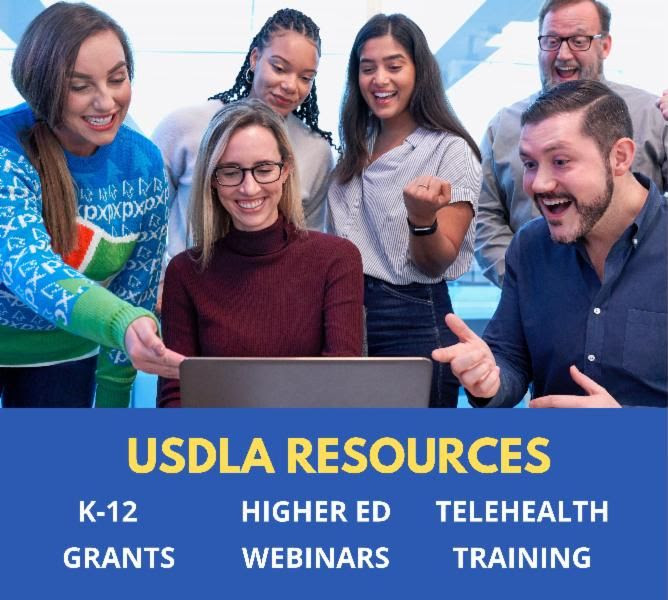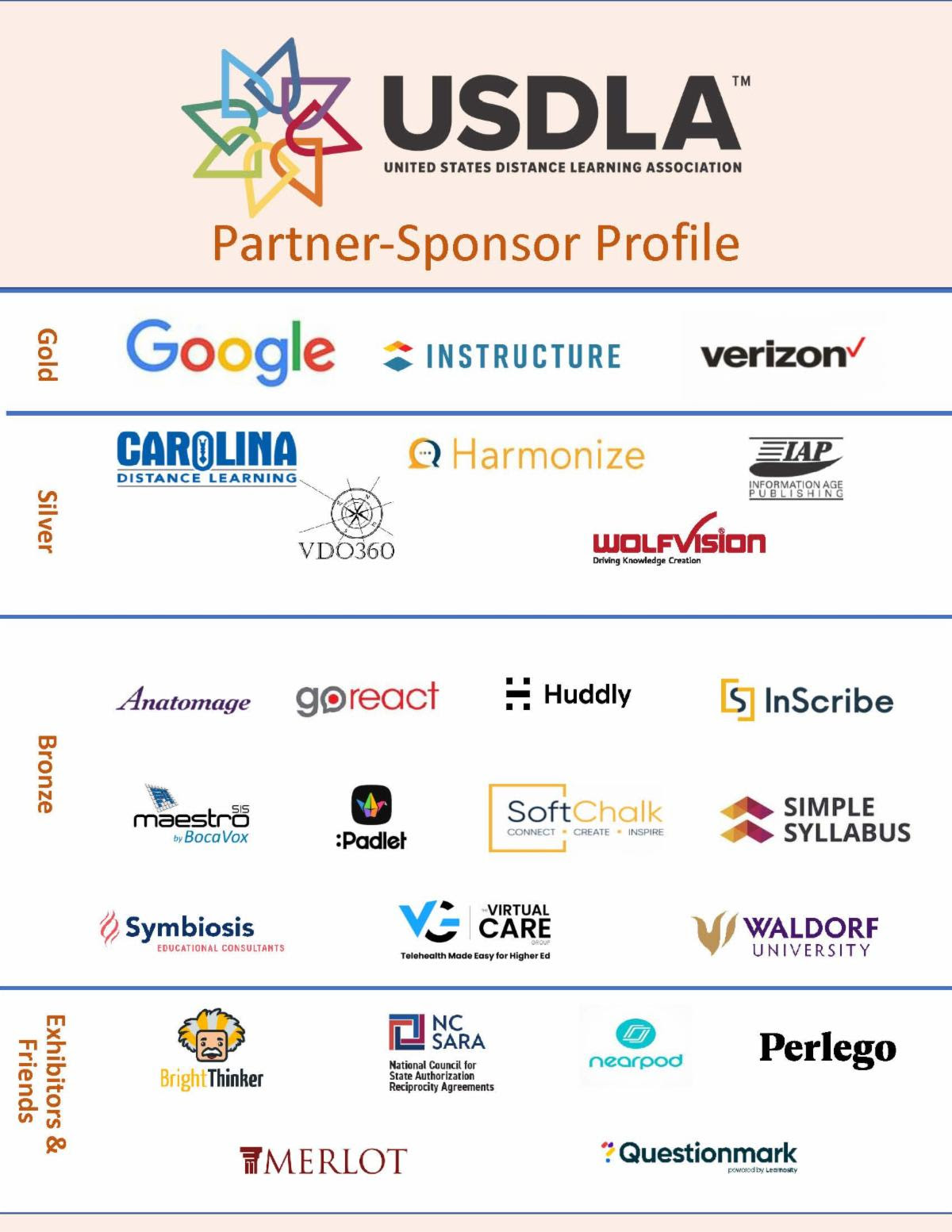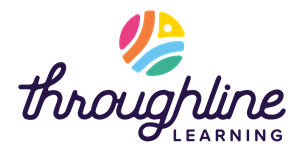USDLA NEWS
Tuesday, May 7: USDLA National Conference Update
Embrace the Power of Gamification
|
|
|
We are so excited to see you at our 2024 USDLA National Conference!
One thing that conferences and gamification have in common is you will generally get the most out of them if you engage and participate. At this summer’s event you will have multiple opportunities to engage with your fellow attendees. Choose from a variety of activities, including a scavenger hunt that will help you get acquainted with the conference site and the surrounding area, puzzles and games that will help you meet new people, and challenges that will help us all learn from one another. We also have a full track of sessions to help you get in the game with gamification and related topics. Among the sessions and workshops in this track you will find the ones listed below.
Click here to register for the 2024 National Conference: usdla.org/2024-conference-registration/
Special offer: Exhibit-only tables — Available for only $1,500. Click here for details: usdla.org/2024-sponsorship
|
|
|
GAMIFICATION RULES: 2024 NATIONAL CONFERENCE
EDUCATIONAL, INFORMATIONAL, INSIGHTFUL, FUN!
|
|
|
Keys to Unlock Easy and Engaging Digital Escape Room Activities in Online Courses
Are you in search of a unique activity to increase engagement in your online course? Have you ever considered creating a digital escape room? It’s easier than you think and can be done for free (or very little cost). In this session, you will learn about some important considerations for developing a digital escape room activity. In this session, you will see how easy they are to create and customize with the opportunity to build your own. You will also be provided with helpful resources, tips, suggestions and techniques to create your own digital escape room activity.
About the presenter: Debra Lukin has been working as an instructional designer and training coordinator in higher education for over 10 years. She managed the University of Central Florida’s Environmental Health and Safety training program and worked with subject matter experts to design, build, and schedule the university’s online and face-to-face safety training courses, ensuring compliance with federal, state, and local regulations. After joining UCF’s Center for Distributed Learning in 2018, she works closely with faculty assisting them with the development and design of their online and blended courses. She is also active on several departmental committees for topics such as professional development, the quality online initiative, and open education resources. Her primary research focus is on using games in learning and gamification strategies. Debra earned a Master’s degree in Instructional Design and Technology from UCF in 2013 and a Graduate Certificate in e-Learning from UCF in 2016.
|
|
|
Learner Personas: Design Learning Experience They Enjoy with Jonathan Peters, PhD
When we create learning experiences for everyone, we end up creating for no one, which means we end up with the same old dull, dry, boring programs. Imagine a more targeted approach that allows you to create a learning event THEY enjoy. Whether you’re using gamification or new technologies, having learner personas allows you to target your message and apply learning tools that will appeal to your audience…most of them. Drawing from a process used by successful marketers, you, too, can target your ‘product’ to specific audiences. In this interactive presentation, you will learn about why we need personas and how you can create ones for your organization. In fact, we will begin creating during the fast-paced session. In a time when we expect individualized experiences, it is time to create learning experiences that “they” enjoy.
Deliberate Fun: A Purposeful Approach to Gamifying Learning Experiences
When it comes to creating gamified or game-based learning experiences, most practitioners throw game mechanics at a program without a methodology or rational strategy. They assume that what is fun for them will be fun for their learners. The results are hit-or-miss. When budgets and time are in short supply, organizations cannot afford to simply apply game mechanics without a purposeful approach that predicts which game mechanics will appeal to this specific audience. This session outlines a practical approach to determining which game mechanics will motivate a targeted audience. You will learn how an empirically-based taxonomy of core human desires predicts what will be ‘fun’ for specific participants, why some people like competition while others prefer quiet concentration, and still others let it all ride on black. Instead of trying to force everyone to play your game, you will create experiences designed specifically for them. The results? Engaged, excited, and happy learners, and a healthy return on your investment.
About the presenter: Jonathan Peters, PhD, studies the science and art of motivation. As a speaker, he has helped audiences from Melbourne, Australia, to Augusta, Maine, communicate more effectively with their customers and team members. As the Chief Motivation Officer at Sententia, he applies his knowledge and experience to make learning more enticing, engaging, and encouraging through gamification.
|
|
|
Gamification Triforce: Understanding Users, Metrics, and Game Mechanics for a Successful Gamification Implementation
The key to a winning gamification strategy is understanding the best types of game elements for both the metrics you want to change AND that your users will enjoy! Implementation of gamification for the sake of doing so rarely, if ever, has the effect you anticipate. To succeed, we must understand the types of game elements available, know the KPI you hope to affect, and understand the type of user (or ‘player’) that is engaging with your content. We will be breaking down the Triforce of Gamification: Users, Metrics, and Mechanics. Knowing the specific details of each of these can help you devise a proper plan for the implementation of a gamification strategy. Just like various games appeal to certain players, so too should the mechanic we add to our content. Introverts rarely enjoy heated competition, and those that are motivated by winning may not enjoy long drawn out storytelling. In the same way, the metric you hope to improve also has game elements that work better or worse. If we cannot understand the eccentricities between these things, how could we expect to succeed in a gamified feature implementation?
Bret Wardle, Instructor, Neumont College is based in Salt Lake City, Utah, and is a seasoned game/Software professional with over 15 years of experience in crafting immersive games, innovative software, and highly engaging educational content. His passion lies in combining the realms of design psychology from gaming with other landscapes. He’s dedicated to uncovering the intriguing parallels between professional e-sport players and software power users, as well as exploring the social dynamics ignited by elements like “hi-scores” in educational platforms. Bret delights in translating these insights into tangible enhancements, creating products and experiences that resonate deeply with users. Don’t miss his enlightening 2022 TEDx Talk, “Can a 90s video game be a standard for experience design?”, available online for a captivating dive into his perspective on the fusion of gaming and design.
Click here to check out his TEDx Talk!
|
|
|
That’s not all!
Join USDLA Florida Chapter President, Dr. Victoria Brown and her colleagues, Emmalyn Green and Daniel Suarez for “I Loved My Class: Gamification that Works!” Find out how Jerry Fix and Mike Hyzy apply behavioral economics and gamification in learning and training environments in “Increasing Remote Team Engagement through Motivational Design.” Mike will also be joined by Shanti Greene for “Leveling Up Learning: The Revolutionary Fusion of Gamification and Generative AI.” For those interested in the rapidly growing world of eSports, Farah Bennani and Kae Novak will be discussing “Online learning and rapid strategy adoption from eSports.”
The full program can be viewed here.
|
|
| Thank You to Our National Sponsors
Instructure, Google, Verizon, Carolina Distance Learning, Harmonize, IAP, Nearpod, Wolfvision, Anatomage, GoReact, Huddly, InScribe, BocaVox, Softchalk, NC Sara, Simple Syllabus, VDO360, Symbiosis, VirtualCare, Waldorf University, Merlot, Questionmark, Perlego, Padlet, BrightThinker
|
|
| Thank you for supporting USDLA, our Sponsors, and our State Chapters.
Chuck Sengstock, President
Valary Oleinik, President-elect
About United States Distance Learning Association (USDLA)
Formed in 1987, USDLA is a 501(c)3 non-profit association formed in 1987. Our weekly newsletters reach more than 100,000 people globally, including our members and sponsors working in industries including pre-K-12 education, homeschooling, higher education, continuing education, corporate, military, government, and telehealth. Our mission is to promote the development and application of distance learning for education, training, advocacy, and networking: USDLA.org
|
|
|
|
|






















